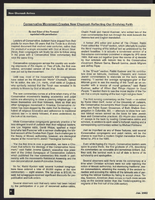Search the Special Collections and Archives Portal
Search Results

Transcript of interview with Lawrence Canarelli by Claytee White, May 1, 2016
Date
Archival Collection
Description
“At five years old, I was the youngest boy at the orphanage. This was the first time that I had lived with indoor plumbing and indoor showers.” To describe award-winning home builder Larry Canarelli as a self-made man is to grossly understate his accomplishments and his determination. Canarelli, founder of American West, Nevada’s largest privately owned development company, learned all about living without shelter as a very young boy. When he was nine years old, Canarelli, the second of his mother’s six children, encouraged his veteran stepfather to buy the family’s first permanent house for $80 down and an agreement to assume payments on the Veterans Administration loan. As his school peers dreamt of large, shiny cars, Canarelli envisaged big, beautiful houses. After self-funding his education, graduating from the University of California Los Angeles, completing two years of U.S. Army service, and earning his Master’s degree from University of Southern California, Canarelli began his career working with a large home building firm in the Los Angeles area. Three years later he switched firms, and the new company sent him to Las Vegas. In this interview, Canarelli reaches back to his childhood to explain his motivation to build houses: “All of my life, I had an interest in housing. Perhaps this is because of never having a house when I was younger.” He recalls how the Collins Brothers helped him when he founded American West. He describes the Southern Nevada “shelter market” of the 1970s and follows its evolution in style and marketing through the 1980s and 1990s; he talks about master planning and the builders who first master planned their Clark County developments: Pardee Homes in Spring Valley, American Nevada in Green Valley, and Howard Hughes Corporation in Summerlin. He speaks to the influences of interest rates and available land on housing prices; the importance of environmentally responsible housing; where the entry-level housing market will go, and ways that technology has changed home building and home buying. And throughout, he exemplifies his devotion to, knowledge of, and respect for Southern Nevada’s housing industry-its builders, its market, and its buyers.
Text

Transcript of interview with Kenneth F. Johann by Gloria Banks, March 1, 1980
Date
Archival Collection
Description
On March 1, 1980, Gloria Banks interviewed her business acquaintance, Kenneth F. Johann (born 1924 in New York City) about his work life in Las Vegas, Nevada. The two discuss the origins of Johann’s business and early land prices in Southern Nevada. Johann explains the history of his investments as well as how land development progressed in Las Vegas from the 1950s and onward.
Text

Transcript of interview with James Bonnell by Gerald L. Conner, February 22, 1977
Date
Archival Collection
Description
On February 22, 1977, James Bonnell interviewed Gerald L. Connor (born 1930 in Boston, Massachusetts) about his experiences in Nevada and his work in education. Connor first talks about his move to Nevada while he was a member of the United States Air Force. He then discusses his education, including that at the University of Nevada, Las Vegas, and also describes his church membership. Connor later talks about changes in the schools and school district, the growth of gambling and properties located in Downtown Las Vegas and the Las Vegas Strip, and the early atomic tests at the Nevada Test Site. He also describes in detail his political activity and involvement with the Democratic Party, including his work with candidates for the offices of Nevada Governor and United States Senator. Towards the end of the interview, Connor talks about events such as Helldorado, the growth of the city over time, and his thoughts on the future of Las Vegas.
Text

Transcript of interview with Robert D. Howell by Joe Sant, February 26, 1977
Date
Archival Collection
Description
On February 26, 1977, collector Joe Sant interviewed local Nevadan business owner, Robert D. Howell (born November 22nd, 1939 in Las Vegas, Nevada) in his home in Las Vegas, Nevada. This interview covers Las Vegas in the old days, from Mr. Howell’s personal experience of being born and raised in Nevada. During this interview, Mr. Howell also discusses the early above ground atomic tests, local environmental and social changes, the economic landscape, the Mormon Fort, religious beliefs, and local recreation. The interview concludes with discussion on air pollution.
Text
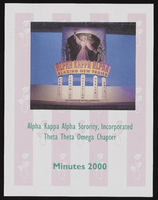
Alpha Kappa Alpha Sorority, Theta Theta Omega Chapter meeting minutes (redacted)
Date
Archival Collection
Description
From the Alpha Kappa Alpha Sorority, Incorporated, Theta Theta Omega Chapter Records (MS-01014) -- Chapter records file.
Text
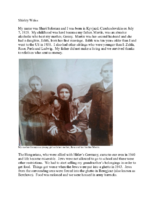
Biographical essay by Shirley Weiss, 2014
Date
Archival Collection
Description
Shirley Weiss describes her childhood housed in army barracks in the ghetto in Beregszasz (Berehove), Hungary. She was sent to Auschwitz-Birkenau, and several other camps, and eventually liberated from Terez?n in 1945. She came to the United States via Sweden.
Text
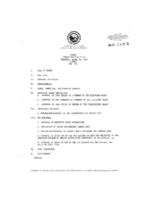
Meeting minutes for Consolidated Student Senate University of Nevada, Las Vegas, April 26, 1990
Date
Archival Collection
Description
Text
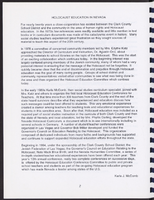
Holocaust Education Conference program, 1997
Date
Archival Collection
Description
Booklet program from the Holocaust Education Conference, 1997.
Text
University of Nevada, Las Vegas Office of Vice President for Academic Affairs Records
Identifier
Abstract
Records are comprised of the University of Nevada, Las Vegas (UNLV) Office of the Vice President for Academic Affairs records from 1952 to 2009. The collection contains information about UNLV's academic affairs including information about the development and growth of departments, as well as what type of classes were offered. The collection also includes faculty schedule cards from 1955 to 1978.
Archival Collection

